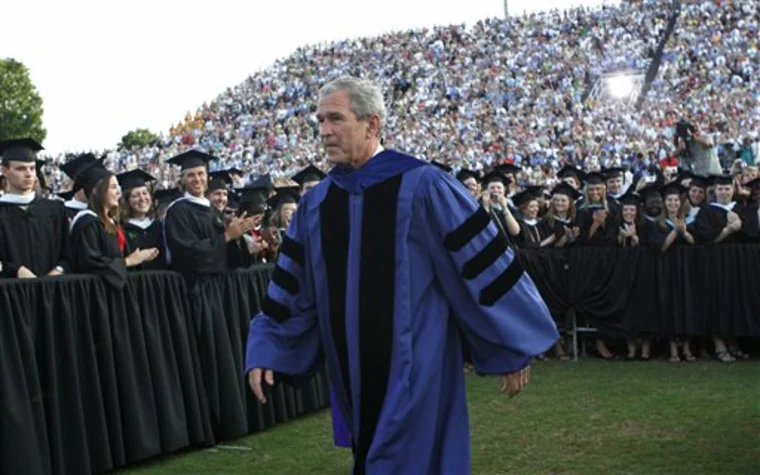Duke University’s commencement ceremony became a battleground of ideas and values when it was announced that comedian Jerry Seinfeld would deliver the keynote address. The decision sparked a whirlwind of reactions from students, faculty, and alumni, with both support and protests echoing across the campus.
For many students, the prospect of hearing from a renowned entertainer like Seinfeld was cause for excitement and anticipation. His wit and humor, honed over decades in the spotlight, promised to provide a lighthearted and memorable send-off for the graduating class. Supporters of Seinfeld’s invitation applauded the university’s choice, citing his cultural influence and comedic prowess as reasons to welcome him to the commencement stage.
However, not everyone shared in the enthusiasm. A vocal contingent of students expressed objections to Seinfeld’s selection as commencement speaker, citing concerns over past remarks and actions that they deemed offensive or insensitive. Some pointed to instances of Seinfeld’s humor that they felt perpetuated harmful stereotypes or marginalized certain groups.
The announcement of Seinfeld’s address prompted organized protests and petitions calling for the university to rescind the invitation. Demonstrators gathered on campus, wielding signs and chanting slogans in opposition to Seinfeld’s appearance. They argued that his presence at the ceremony would send the wrong message and detract from the inclusive and welcoming environment that Duke seeks to cultivate.
In response to the controversy, Duke University issued statements reaffirming its commitment to free speech and academic freedom, while also acknowledging the concerns raised by students. University officials emphasized the importance of engaging with diverse perspectives, even those that may be challenging or uncomfortable.
As the commencement ceremony approached, tensions remained high, with supporters and protesters alike eagerly awaiting Seinfeld’s address. The event unfolded against a backdrop of heightened scrutiny and debate, underscoring the complexities of navigating issues of free speech, humor, and inclusivity in today’s society.
In the end, Seinfeld delivered his speech to a divided audience, with some students applauding his remarks while others remained silent or staged symbolic protests. The controversy surrounding his appearance at Duke’s commencement ceremony served as a microcosm of broader debates around free speech and cultural sensitivity, leaving an indelible mark on the university community and sparking ongoing conversations about the intersection of comedy, identity, and social justice.
Duke University’s decision to invite comedian Jerry Seinfeld as the keynote speaker for its commencement ceremony ignited a whirlwind of reactions and debates across campus. While many students were thrilled at the prospect of hearing from a cultural icon known for his wit and humor, others expressed deep reservations about Seinfeld’s selection, citing concerns over his past comments and actions.
Supporters of Seinfeld’s invitation saw it as a rare opportunity to be entertained and inspired by a beloved figure whose comedic talents have shaped generations. They lauded Duke’s decision, believing that Seinfeld’s presence would add a touch of levity and excitement to an otherwise solemn occasion. For them, Seinfeld’s brand of humor represented a welcome departure from the traditional commencement address, promising an engaging and memorable experience for the graduating class.
However, not everyone shared in the enthusiasm. A vocal segment of students voiced objections to Seinfeld’s selection, pointing to instances where they felt his humor crossed the line into insensitivity or perpetuated harmful stereotypes. Past remarks and jokes deemed offensive or culturally insensitive became focal points of contention, fueling calls for the university to rescind its invitation.
The controversy surrounding Seinfeld’s appearance at Duke’s commencement ceremony escalated as protests and petitions emerged, demanding that the university reconsider its decision. Demonstrators gathered on campus, voicing their concerns and advocating for greater accountability in the selection of speakers. They argued that Seinfeld’s presence at the ceremony would undermine the university’s commitment to diversity and inclusion, sending a message contrary to its values.
In response, Duke University grappled with the delicate balance between upholding principles of free speech and addressing the legitimate concerns raised by students. University officials reaffirmed their dedication to fostering a campus environment where all voices are heard and respected, while also acknowledging the complexities of navigating issues of humor and cultural sensitivity.
As the commencement ceremony drew near, tensions remained palpable, with both supporters and protesters preparing to make their voices heard. Seinfeld’s address unfolded against a backdrop of heightened scrutiny and debate, with students listening attentively to his remarks while others staged silent protests or opted to sit out the speech altogether.
In the aftermath of Seinfeld’s appearance, the controversy continued to reverberate throughout the Duke University community, sparking ongoing conversations about the intersection of comedy, identity, and social responsibility. The episode served as a poignant reminder of the challenges inherent in navigating issues of free speech and cultural sensitivity in an increasingly diverse and interconnected world.
